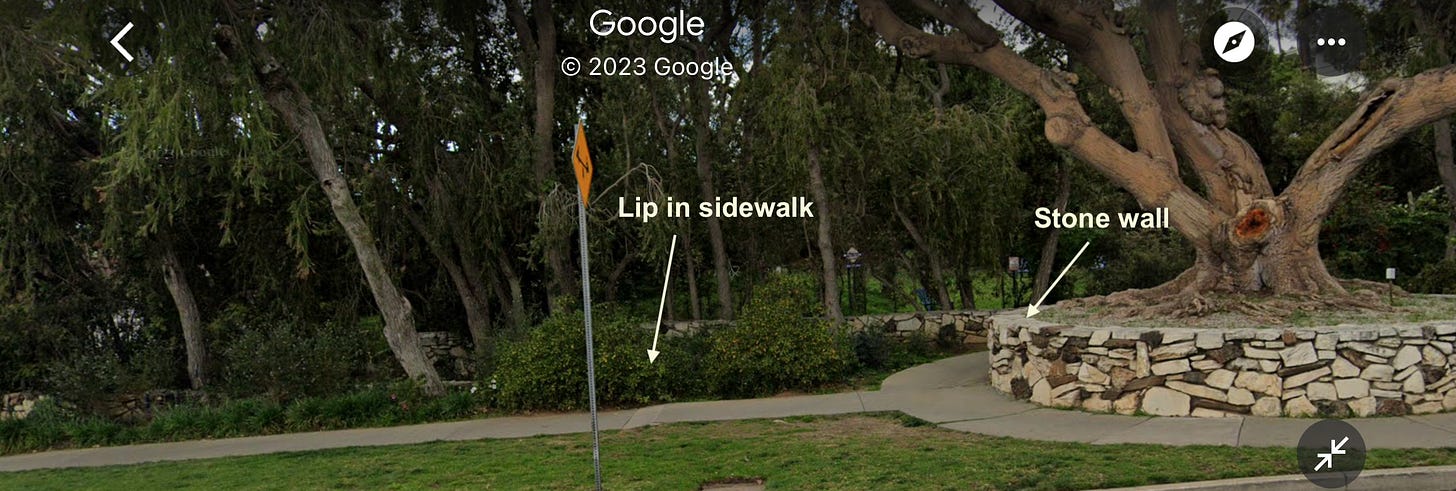220. The Worst Problem At Work And Why These 2 Words Matter
Don't pat my back. You'll thank me later
Shout out to CANVA
I love Canva. And now that they have AI integrated? You better be using it.
Now it’s not just a design tool, but it’s also your best copywriter for blog outlines, lists, content ideas, brainstorms, and more.
I’ve gotten very lucky at least 8 times in my life:
When I was 12, I blindly ran across a busy road without looking for traffic
At 16, a car swerved over the yellow line and hit me head on
At 18, I mistakenly ran a red light, just 1/4 of a second short of being t-boned by a speeding truck
At 21, I got into a car driven by my very drunk friend. He reached 80mph on a 25mph road when he lost control of the car
At 22, I was with a different friend who was driving drunk. The car hit a construction pylon on a major highway at night. We spun in circles and stalled, in the dark, no lights on, facing oncoming traffic barreling towards us at 70mph
At 25, I was mountain biking alone in a restricted area and slid off a cliff side. I had to hang there for hours until I was found
At 32, I went over a jump while mountain biking alone. I lost control and landed on my head, miles from any other person
And then there was last week.
While out for a run I blindly tripped on a lip in the sidewalk. I stumbled for 3 or 4 steps before falling forward and ramming at full force, head first, into a stone wall.
I felt my spine compress.
I screamed in intense pain.
I writhed on the ground.
Ambulance.
Emergency room.
CAT scans.
Two broken bones in my back (acute fractures of the t1 and t2 transverse processes, since you asked. Look it up).
Please, don’t have pity on me.
Because I have nothing but gratitude.
You Can’t Force Feelings
Imagine you’re in love with someone. And imagine you tell that person regularly how much you love them. (Aren’t you just the sweetest. I knew I liked you for a reason.)
But wait. Imagine that this partner of yours never actually tells you that they love you.
Like, never.
It feels empty, right?
So maybe one day you ask them to say those words to you. They respond with the very words you want to hear.
“I love you,” they say, just like you requested.
Somehow the words don’t feel satisfying, right? They probably feel forced and far from genuine.
Ok, another example...
Let’s say that you want a surprise party for your birthday. You’ve never had one and always wanted one and you just know for sure how awesome it will be. So one day, a few months before your birthday, you ask your bestie to organize a surprise party for you.
Awesome. You can’t wait. The butterflies are all aflutter in your GI tract (or wherever those butterflies hide out - I was never good at biology).
The surprise party happens. And…?
Well...it’s not really a surprise anymore, is it?
It definitely doesn’t feel like the surprise you expected. Maybe it’s a bit of a letdown.
Yeah, it’s definitely a letdown.
You Can’t Stage Gratitude
Here’s the reality: You can’t stage feelings of being appreciated.
The experiences that make you feel appreciated either happen naturally or don’t happen at all.
If you try to force gratitude from other people, it’ll rarely make you feel good.
Your partner not saying they love you without you asking, your bestie not throwing you a surprise party without you requesting it - this is exactly why people quit their jobs.
And it is exactly why the broken bones in my back are important to you.
We’re almost there… keep reading.
The Worst Problem At Work
Studies have shown that people are far less likely to express gratitude at work than anywhere else.
It’s true.
Even a simple “thank you” is heard less often at work than everywhere else. Yet people definitely want to hear “thank you” a lot more.
Almost every worker agrees that being told “thank you” makes them feel happier and more fulfilled. Despite this, 90% of people do not ever say “thank you” on an average day at work.
In fact, 2/3 of those people claim that they never express gratitude at work ever - or at least no more than 1x per year!!
It gets even more nutso when you realize that people believe showing gratitude is a sign of weakness and opens them up to being taken advantage of by others.
What kind of cold, heartless monster have we created?!
The #1 Reason People Leave Their Jobs
The number one reason people leave their jobs is a lack of feeling respected and appreciated at work.
In fact, almost everybody (92%) says that they would be more likely to remain at their job if their bosses showed more empathy.
Ok, let’s pause here for a second.
Hows about I do a quick recap. You know, just in case you weren’t paying close attention or haven’t been taking notes.
This is important stuff. Here goes:
Fact #1. Almost everybody wants to experience gratitude at work.
Fact #2. Almost everybody wants to be recognized and thanked for their achievements at work.
Fact #3. The reason people leave jobs is that they aren’t getting recognized and there is little-to-no gratitude (see Facts #1 and #2 above).
Despite this...
Fact #4. 90% of people don’t express gratitude at work
[Editor’s Note: smh. himh.]
The Two Word Solution
Call me crazy, but it seems to me that we have a MASSIVE problem with a very simple solution.
The problem: people feel unappreciated at work, so they aren’t overly productive and/or they leave their job.
The simple solution: Say “thank you” more often at work.
That’s it. That’s all.
Those two words fix the #1 reason why people leave your company.
In Which I Hit You Upside The Head About Why This Matters To You
I’m just gonna pick up this proverbial gratitude 2x4 over here and smack you upside the head with some facts about your business and culture.
Here are 9 things that are proven to happen in a company with a culture of gratitude:
More motivated employees
Higher employee engagement (which leads to higher productivity)
Better teamwork
Happier workforce
Healthier workforce
Higher sense of self-efficacy
Increased performance
Increased resilience to stress
Reduced anxiety and fear
Grateful people are more fulfilled.
Grateful bosses are more likely to be successful.
The most productive companies have cultures of gratitude.
What The Heck Are You Doing?
I get it. You may not understand or believe the importance of this whole gratitude thing. Maybe you believe I’m a little too “woo woo” for your liking.
In fact, you’re probably thinking the same thing that I hear most from leaders who want to fight these facts. You’re thinking:
“Workers are too sensitive these days. I DO thank people. I do it all the time. But I’m not going to thank people for just showing up and doing their damn job!”
First off, let’s all calm down here for a second. Nobody’s asking you to reward people for breathing. And nobody is saying you don’t say thank you, at least every now and then. Maybe you do, maybe you don’t, that’s between you and the mirror.
What I AM saying, is that it’s not about you. It’s about creating an entire culture of gratitude.
A culture of gratitude is one in which everybody acknowledges each other for productivity and excellence.
You can choose to ignore me. That’s fine. You can wait until you hear about the exit interviews for your subordinates and how they complain about the lack of gratitude and rarely feeling appreciated.
Here’s the problem - just like the partner who is forced to say “I love you” and like the friend who is forced to put on a “surprise party” - by the time your employees tell you they want you to be more grateful, it’s too late. Your response will feel forced and inauthentic.
So I’m doing you a favor. I am here to tell you so that you can be authentic and make a difference.
You need to create a greater culture of gratitude. Period. End of story.
The Gratitude Challenge
You know what, I’m not done talking to you yet. In fact, I challenge you.
<pulls off white glove, thwacks you across the cheek with it>
Think of somebody at work that you’re grateful for. Do that right now.
The moment you finish this article, I want you to express gratitude to them. Tell them what you are grateful for and why. Do it with authenticity. I don’t care if it’s done in person, on the phone, in email, Slack, text or yodeling.
Just do it.
And for the next 2 weeks, every day you are at work, I challenge you to thank somebody else in the same way. Put it on your calendar so you don’t forget. Every day at, say, 1:55 pm (right before your 2:00 nap), remind yourself to show gratitude.
This brings us back to my back…
The Backside of Gratitude
The thing about giving gratitude, is you’re more likely to get it back.
People who have heard about my injury naturally react with pity. They assume I’m miserable. They assume I’m angry that it happened.
I’m not any of those.
Far from it.
After all, if my head were angled a mere 1” in any other direction, I could’ve had bad neck damage, been paralyzed…or worse.
So am I angry? Do I have pity?
Hell no.
I have so much gratitude for being able to be here today to write this. And that, in turn, gives me even more gratitude for you.
Time is our scarcest commodity. I am humbled and honored that you give me a few minutes of your time every week.
I am grateful that you help me uncover these nuggets of wisdom that allow both of us live more fulfilling, more enriched, and happier lives.
So, yes, I have a lot of gratitude for my back injury. And that has given me even more gratitude for you.
Thank you.
Thank you.
Thank you.
If you liked what I said above, you should watch this video, but it is NSFW
A Somewhat Relevant Quote
“Appreciation can make a day, even change a life. Your willingness to put it into words is all that is necessary.”
Margaret Cousins - suffragist extraordinaire
Random News
Goldwich – Would you like to order the world’s most expensive sandwich?
CRO – The new Chief has nothing to do with sales
OK, it’s cool – Somebody just paid $15m for a license plate
Can It – You know how you dreamed you could live in a can of beans? You’re welcome.








im sorry to hear you went through this and greatly appreciate your response of gratitude. I think gratitude is neutralizing, meaning it can reduce the 'suffering' in a painful situation. It seems challenging to arrive there in an authentic way if emotions run high, (to me) humility and acceptance of 'what is' aids its presence. I try to bring that into my work, also when interacting with colleagues or independent contractors (whom i rely on).